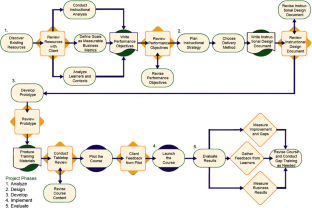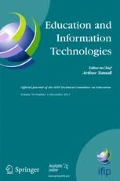Abstract
The Internet has made online learning possible, and many educators and researchers are interested in online learning courses to enhance and improve the student learning outcomes while battling the shortage in resources, facilities and equipment particularly in higher education institution. Online learning has become popular because of its potential for providing more flexible access to content and instruction at any time, from any place. It is imperative that the researchers consider, and examine the efficacy of online learning in educating students. For this study, the researchers reviewed literature through meta-analysis as the method of research concerning the use of ADDIE (Analysis, Design, Development, Implementation and Evaluation) framework for designing and developing instructional materials that can provide wider access to quality higher education. This framework can be used to list generic processes that instructional designers and training developers use (Morrison et al., 2010). It represents a descriptive guideline for building effective training and performance support tools in five phases, as follows: 1.) Analysis, 2.) Design, 3.) Development, 4.) Implementation, and 5.) Evaluation. The researchers collected papers relating to online learning courses efficacy studies to provide a synthesis of scientifically rigorous knowledge in online learning courses, the researchers searched on ERIC (Education Resources Information Center), ProQuest databases, PubMed, Crossref, Scribd EBSCO, and Scopus. The researchers also conducted a manual search using Google Scholar. Based on the analysis, three main themes developed: 1.) comparison of online learning and traditional face-to-face setting, 2.) identification of important factors of online learning delivery, and 3.) factors of institutional adoption of online learning. Based on the results obtained 50 articles. The researchers examine each paper and found 30 articles that met the efficacy of online learning courses through having well-planned, well-designed courses and programs for higher education institution. Also, it highlights the importance of instructional design and the active role of institutions play in providing support structures for educators and students. Identification of different processes and activities in designing and developing an Online Learning Courses for Higher Education Institution will be the second phase of this study for which the researchers will consider using the theoretical aspect of the ADDIE framework.


Similar content being viewed by others
References
Allen, E., & Seaman, J. (2010). Class Difference$: Online Education in the United States. http://sloanconsortium.org/publications/survey/class_differences
Alonso, F., Lopez, G., Manrique, D., & Vines, J. M. (2005). An instructional model for web-based e-learning education with a blended learning process approach. British Journal of Educational Technology, 36(2), 217–235 http://www.fisme.science.uu.nl/publicaties/literatuur/2005_modelforwebbasedelearning.pdf.
Arbaugh, J.B., Godfrey, M., Johnson, M., Pollack, BL., Niendorf, B., & Wresch, W., (2009). Research in online and blended learning in the business disciplines: Key findings and possible future directions. http://www.sciencedirect.com/science/article/pii/S1096751609000268.
Bell, B. S., & Fedeman, J. E. (2013). E-learning in postsecondary education. The Future of Children, 23(1), 165–185.
Chen, L., (2016). A Model for Effective Online Instructional Design. http://infonomics-society.org/wpcontent/uploads/licej/published-papers/volume-7-2016/A-Model-for-Effective-Online-Instructional-Design.pdf
Dick, W., Carey, L., & Carey, J. O. (2014). The systematic design of instruction (8th ed.). New Jersey: Pearson Education, Inc..
Finch, D., & Jacobs, K. (2012). Online education: Best practices to promote learning. Proceedings of the Human Factors and Ergonomics 56th Annual Meeting.
Gallagher, S., & LaBrie, J. (2012). Online learning 2.0: Strategies for a mature market. Continuing Higher Education Review, 76, 65–73.
Intulogy. (2010) ADDIE Instructional Design Model. http://www.intulogy.com/addie/
Lorenzetti, J. (2013). Academic Administration - Running a MOOC: Secrets of the World’s Largest Distance Education Classes - Magna Publications.
McConnell, D. (2000). Implementing computer supported cooperative learning.
Morrison, G. R., Ross, S. M., Kemp, J. E., & Kalman, H. (2010). Designing effective instruction (6th ed.). Hoboken: Wiley.
Neuhauser, C., (2010). Learning Style and Effectiveness of Online and Face-to-Face Instruction. http://www.tandfonline.com/doi/abs/10.1207/S15389286AJDE1602_4
Pape, L. (2010). Blended Teaching & Learning. School Administrator, 67(4), 16–21.
Parsad, B., & Lewis, L. (2008). Distance education at degree-granting Postsecondary Institutions: 2006–2007 (NCES 2009–044). National Center for Education Statistics, Institute of Education Sciences. Washington, DC: US Department of Education http://nces.ed.gov/pubs2009/2009044.pdf.
Patrick, S., & Powell, A., (2009). A Summary of Research on the Effectiveness of K-12 Online Learning. https://?id=ED/?id=ED509626
Quality Matters (2015). QM publisher rubric: https://www.qualitymatters.org/
Razali, S., Nadiyah, S.F., (2015). The Development of Online Project Based Collaborative Learning Using ADDIE Model. http://www.sciencedirect.com/science/article/pii/S1877042815038719.
Roblyer, M. D. (2015). Introduction to systematic instructional design for traditional, online, and blended environments. New Jersey: Pearson Education, Inc..
Rubric for Online Instruction (2010). QOLT (Quality Online Teaching and Learning). http://courseredesign.csuprojects.org/wp/qolt/
Saba, F. (2012). A systems approach to the future of distance education in colleges and universities: Research, development, and implementation. Continuing Higher Education Review, 76, 30–37.
Schmid, R. F., Bernard, R. M., Borokhovski, E., Tamim, R. M., Abrami, P. C., & Surkes, M. A. (2014). The effects of technology use in postsecondary education: A meta-analysis of classroom applications. Computers & Education, 72, 271–291.
Serhat, K., (2017). ADDIE Model: Instructional Design. https://educationaltechnology.net/the-addie-modelinstructional-design/.
Sherry, L. (1995). Issues in distance learning. International Journal of Educational Telecommunications, 1(4), 337–365.
Siemens, G., Gasevic, D., & Dawson, S., (2015). Preparing for the Digital University: A review of the history and current state of distance, blended, and online learning. https://linkresearchlab.org/PreparingDigitalUniversity.pdf
Siragusa, L., Dixon, K. C., & Dixon, R., (2007). Designing quality e-learning environments in higher education. http://www.ascilite.org.au/conferences/singapore07/procs/siragusa.pdf
Zhang, D., (2010). Interactive Multimedia-Based E-Learning: A Study of Effectiveness. http://www.tandfonline.com/doi/abs/10.1207/s15389286ajde1903_3
Author information
Authors and Affiliations
Corresponding author
Additional information
Publisher’s note
Springer Nature remains neutral with regard to jurisdictional claims in published maps and institutional affiliations.
Rights and permissions
About this article
Cite this article
Castro, M.D.B., Tumibay, G.M. A literature review: efficacy of online learning courses for higher education institution using meta-analysis. Educ Inf Technol 26, 1367–1385 (2021). https://doi.org/10.1007/s10639-019-10027-z
Received:
Accepted:
Published:
Issue Date:
DOI: https://doi.org/10.1007/s10639-019-10027-z




